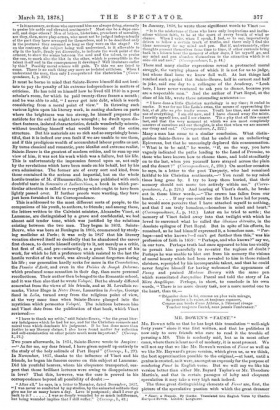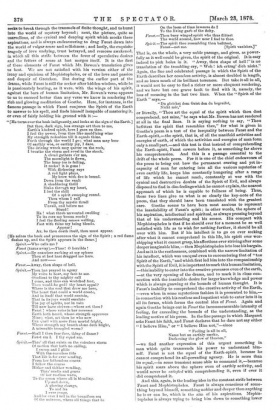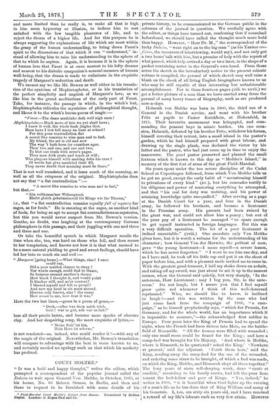MR. BOVVEN'S "FAUST."*
Mn. BOWEN tells us that he has kept this translation " well-nigh forty years " since it was first written, and that he publishes it now only to save friends who care to read it the trouble of perusing a MS. This is modestly said, but as in most other cases, where there is least need of modesty, it is most present. We will not say that we like Mr. Bowen's version of Faust as well as we like Mr. Hayward's prose version, which gives us, as we think, the best approximation possible to the original,—at least, until a genius is created, as it were, amongst us expressly for the purpose of rendering Faust in English verse. But we will say we like his version better than either Mr. Bayard Taylor's or Mr. Theodore• Martin's, and that in certain passages of lofty and eloquent speculation it may take a very high rank indeed.
The three great distinguishing elements of Faust are, first, the• picture of the speculative passion with which the great dreamer • Faint: a Tragedy. By Goethe. Translated into English Verse by Charles. llaripole Bowen. London: Longrr,ene.
seeks to break through the trammels of finite thought, and to burst into the world of mystery beyond ; next, the picture, quite as marvellous, of the cynical and denying spirit which mocks these aspirations, and is always endeavouring to drag Faust down into the world of vulgar sense and selfishness ; and lastly, the exquisite tragedy of love undying, trust betrayed, and remorse awakened, in which all this strife between the fever of speculative desires and the fetters of sense at last merges itself. It is the first of these elements of Faust which Mr. Bowen's translation gives us best. We are not satisfied with his version either of the irony and cynicism of Mephistopheles, or of the love and passion and despair of Gretchen. But during the earlier part of the drama, while Faust is still the seeker after hidden wisdom, while he is passionately beating, as it were, with the wings of his spirit, against the bars of human limitation, Mr. Bowen's verse appears to us to succeed better than any verse we know in rendering the rich and glowing meditation of Goethe. Here, for instance, is the famous passage in which Faust conjures the Spirit of the Earth to answer to his spell, and finds himself incapable of mastering it, or even of fairly holding his ground with it :—
44 [He turns over the book indignantly, and looks at the sign of the Earth.]
But thou, dark sign, less strange art thou to me, Earth's kindred spirit, here I gaze on thee.
I feel thy power, from thee like madd'niug wine My strength redoubles till it equals thine.
Forth through the world I go ; what man may bear Of earthly woe, or earthly joy, I dare.
The driving wreck may quiver on the rock, I breathe the storm and revel in the shock.
A cloud gathers o'er me, The moonlight is flown, The lamp too is failing, It reeks ! it is gone !
With flickering rays A red light plays, My brow with fire is bound.
Down from the vault A shuddering thrill Sinks through my heart, I feel the chill Of a spirit sweeping round.
Thou whom I call From thy mystic thrall Unveil, and before me Stand !
Ha! what throb unwonted swelling To its core my bosom rends?
I feel the fleeting senses welling, Fast with thine my being blends.
Appear !
Ay, be thou death itself, thou must appear.
[He seizes the book and pronounces the sign of the Spirit ; a red flame flashes up, and the Spirit appears in the flame.] Spirit.—Who calls me ?
Faust (turns away).—Thee! 0 horrible !
Spirit.—By ceaseless sucking at my sphere
Thou at last hast dragged me here.
And now-
Faust.—Away, thou shape of hell.
Spirit—Thou has prayed in agony My voice to hear, my face to see.
Obedient to thy mighty call I come, and thus can wretched fear, Thou would-be god ! thy heart appal? Where is the soul that drew me here, The heart that could a world create, And in itself that world contain, That in its joys would emulate The joy of spirits, nor in vain Till now have striven—whore art thou ?
Faust ! whose voice in her recesses Earth bath heard, whose strength oppresses Mine ; what, art thou he who now Can quail with more than mortal fright, Whose strength my breath alone doth blight, A miserable trampled worm?
Faust.—Sball I then fear thee, thing of flame ? Faust am I. I thy equal am.
Spirit—Thro' all that exists on the voiceless storm
Of motion that bath no ending, I sweep and I glide With the ceaseless tide That life is for ever sending, From her fathomless source I follow the course Hither and thither wending, Thra' cradle and grave Of her restless wave, To the ocean where all is blending. Up and down, A glowing change, To and fro I ever range. And for ever I toil in the boundless sea Of the universe, where all things that be
•
On the loom of time inweave do I To the living garb of the deity.
Faust.—Thou busy winged spirit who thus fittest The world around, how near I feel to thee. Spirit.—The spirit thee resembling thou befittest,
Faust—not me. [Spirit vanishes.]"
That is, on the whole, a very noble passage, and gives, as power- fully as it well could be given, the spirit of the original. It is easy indeed to pick holes in it. " Away, thou shape of hell I" is no translation of the trembling cry, " Weh ! ich ertrag' dich nicht."
Again, the fine and celebrated passage in which the Spirit of the Earth describes her ceaseless activity, is almost doubled in length, and so loses much of its brilliant terseness. But take it all in all, it would not be easy to find a richer or more eloquent rendering, and we have but one grave fault to find with it, namely, the loss of meaning in the last two lines. When the " Spirit of the Earth " says,—
"Du gleichst dem Geist den du begreifst, Nicht mir,"
or literally, " Thou art the equal of the spirit which thou dost comprehend, not mine," he says what Mr. Bowen has not rendered at all in the final lines. It is saying nothing to say, "Thou befittest the spirit that resembles thee," for what is given in Goethe's poem is a test of the inequality between Faust and the Earth-spirit,—the spirit, that is, of all the manifold activities and energies of earth, of which the activities and energies of man form only a small part,—and this test is that instead of comprehending the Earth-spirit, Faust cowers before it, as something far above his comprehension. And this is a passage essential to the drift of the whole poem. For it is one of the chief endeavours of the poem to bring out how the permanent craving and yet in- capacity of man for entering into all the various mysteries of even earthly life, keeps him constantly hungering after a range of life which he cannot reach, constantly at war with the cynical and destructive doubts of the Spirit of Evil, and always disposed to find in dim feelingswhich he cannot explain, the nearest approach of which he is capable to fullness of being. Thus, these two lines give us what is so clearly the key-note of the poem, that they should have been translated with the greatest care. Goethe seems to have been most anxious to represent the insatiability of Faust's spirit ; in other words, the sphere of his aspiration, intellectual and spiritual, as always pressing beyond that of his understanding and his senses. His compact with Mephistopheles is that if he should ever for a moment be so well satisfied with life as to wish for nothing further, it should be all over with him. But if his intellect is to go on ever seeking
after what it cannot comprehend in this life, his spirit ever wor- shipping what it cannot grasp, his affections ever striving after some deeper imaginable bliss, —then Mephistopheles is to lose his bargain. And as it is the restlessness, combined with the narrow limitation of his intellect, which was unequal even to encountering that of "tne Spirit of the Earth," and which first led him into the companionship with the Spirit of Evil, it is important to mark this human limitation, —this inability to enter into the creative processes even of the earth, —at the very opening of the drama, and to mark it in close con- nection with the insatiable desire for larger knowledge and power which is always gnawing at the bounds of human thought. It is Faust's inability to comprehend the creative activity of the Earth, —even when in some mysterious fashion it is presented to him,— in connection with his restless and impatient wish to enter into it in all its forms, which forms the central idea of Faust. Again and again Goethe brings out in Faust the incommensurable intensity of feeling, far exceeding the bounds of the understanding, as the leading motive of his poem. In the fine passage in which Margaret asks Faust his faith, and Faust declares that he dare not say either " I believe Him," or " I believe Him not,"—since
" Feeling is all in all, Name but an earthly smoke, Darkening the glow of Heaven,"
—we find another expression of this urgent something in man which quite transcends his power to understand hint- self. Faust is not the equal of the Earth-spirit, because he cannot comprehend its all-pervading agency. He is more than its equal,—in some transient sense able to command it,—because his spirit soars above the sphere even of earthly activity, and would never be satisfied with comprehending it, even if ever it
did comprehend it.
And this, again, is the leading idea in the constant strife between Faust and Mephistopheles. Faust is always conscious of some- thing beyond himself, something nobler and deeper than anything he is or can be, which is the aim of his aspirations. Mephis- topheles is always trying to bring him down to something lower and more limited than he really is, to make all that is high in him seem hypocrisy or illusion, to induce him to rest satisfied with the low tangible pleasures of . life, and to reject the dream of a higher life. And for this purpose he is always suggesting the explanations of life which are most within the grasp of the human understanding, to bring down Faust's spirit to the dimensions of that which it can " understand," in- stead of allowing him to raise his understanding to the sphere of that to which he aspires. Again, it is because it is in the sphere of human love that Faust is at once nearest to his lofty dreams and nearest to his diabolic companion's sensual measure of human well-being, that the drama is made to culminate in the exquisite tragedy of Margaret's seduction and death.
We cannot say we like Mr. Bowen as well either in his transla- tion of the cynicism of Mephistopheles, or in his translation of the perfect simplicity and anguish of Margaret's love, as we like him in the grand meditations of the early part of Faust.
Take, for instance, the passage in which, in the witch's hut, Mephistopheles ridicules the mysticism of philosophical thought, and likens it to the witch's hocus-pocus of magic:-
"Faust.—The dame methinks cloth well nigh rave !
Mephistopheles.—Much more of this we yet shall have ;
I know it well, the whole book jingles that.
Here have I lost full many an hour at school !
For this your contradiction fiat A secret like remains to wise man and to fool.
My friend, the art is old and now The way 't bath been for countless ages.
Thro' two and one, and one and two, To blot out truth with error's pages.
Thus man doth prate and teach at will ; Who plagues himself with making dolts his care ?
Of words bnt give mankind their fill, They never doubt that meaning must be there."
That is not well translated, and it loses much of the meaning, as well as all the crispness of the original. Mephistopheles does not say that " a flat contradiction " :—
"A secret like remains to wise man and to fool," but that,- " Eta vollkomm'ner Widerspruch
Bleibt gleich geheimnissvoll fiir Kluge wir ffir Thoren,"
i.e., that " a flat contradiction remains equally full of mystery for sages, as for fools." He is sneering at the sages, as another kind of fools, for being so apt to accept fiat contradictions as mysteries,
but this you would never suspect from Mr. Bowen's version. Goethe, no doubt, was laughing at the contemporary German philosophers in this passage, and their juggling with one and three and three and one.
Or take the beautiful speech in which Margaret recalls the time when she, too, was hard on those who fell, and then recurs to her temptation, and knows not how it is that what seemed to be a mere natural yielding to good and sweet feelings, should have led her into so much sin and evil :—
Margaret [going home].—What things, alas! I once
could say, Did a poor maiden chance to stray ! Noi words enough could find to blame, So heinous seemed another's shame.
How black I thought it, and would paint It blacker still, and ne'er content!
I blessed myself and felt so proud !
And now my head in sin must shroud.
Heaven only knows, alas I the cause How sweet to me, how dear it was."
Here the two last lines,—gems in a poem of gems,—
Doch,—alles was dazu mich trieb, Gott ! war so gut, ach war so lieb 1"
lose all their poetic lustre, and become mere specks of obscure clay. And her despairing song, the most exquisite of lyrics,-
" Moine Ruh' ist bin, Mein Herz ist schwer,"
is not rendered—as, indeed, who could render it ?—with any of the magic of the original. Nevertheless, Mr. Bowen's translation will compare to advantage with the best in verse known to us, and certainly needed no apology such as that which his modesty has prefixed.




































 Previous page
Previous page